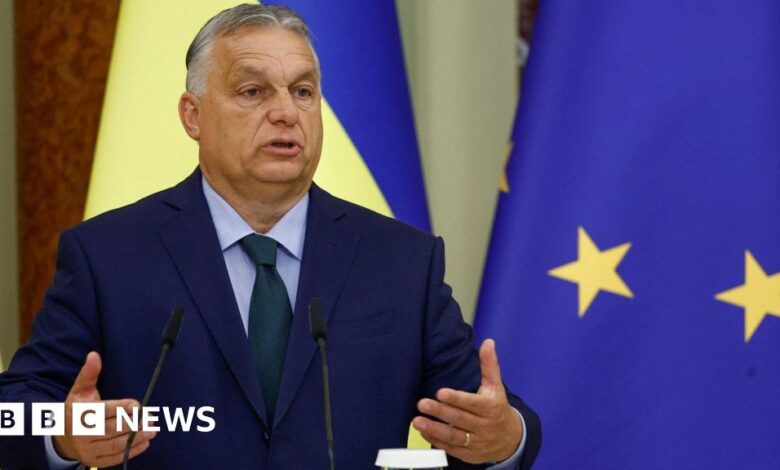Concerns over reports Orban is planning trip to Moscow

Other EU leaders have expressed concern about media reports that Hungarian Prime Minister Viktor Orban may meet Russian President Vladimir Putin in Moscow on Friday.
Mr Orban – who currently holds the EU’s rotating presidency – is the bloc’s only national head of government to have maintained close ties with the Kremlin after the full-scale invasion of Ukraine in 2022.
European Council President Charles Michel said Mr Orban “has no authority to cooperate with Russia on behalf of the EU”, while Polish Prime Minister Donald Tusk demanded clarification.
Several media outlets have reported on Mr Orban’s upcoming visit, citing their sources.
Radio Free Europe/Radio Liberty, a US government-funded media organization, cited a Hungarian government source. They also said Hungarian Foreign Minister Peter Szijjarto would accompany Mr. Orban.
Hungary and Russia did not immediately respond to the BBC’s request for comment.
According to AFP news agency, on Monday, Mr Orban promised to bring “unexpected news from unexpected places”.
In a post on X, Mr. Michel wrote: “The rotating EU presidency has no mandate to cooperate with Russia on behalf of the EU.
“The European Council has been clear: Russia is the aggressor, Ukraine is the victim. No discussion on Ukraine can take place without Ukraine.”
Mr Tusk asked: “The rumours about @PM_ViktorOrban’s visit to Moscow cannot be true, can they?”
Earlier this week, Mr Orban visited Kyiv and said that “a quick ceasefire could be used to speed up peace talks”.
Ukrainian President Volodymyr Zelensky – who has a frosty relationship with Mr Orban – has not publicly responded to the proposal.
But many Ukrainians believe any ceasefire would only cement Russia’s control over territory it has seized from Ukraine, and if negotiations take place they want them to be conducted from a position of strength rather than weakness.
Media speculation about Mr Orban’s visit to Moscow comes as President Putin has again said he is ready to negotiate with Kyiv.
The Kremlin leader has recently publicly outlined some tough preconditions for such talks, but Kyiv and its Western allies say these are tantamount to Ukraine’s surrender.
Mr Orban has been a vocal critic of Western support for Ukraine, having previously stalled a deal on a €50bn ($54bn; £42bn) EU aid package designed to help Ukraine defend itself against Russia.
Tuesday’s visit to Kyiv was his first in 12 years, although he has met Mr Putin several times in that time.
During Mr Orban and Mr Zelensky’s joint appearance, their body language was less than warm, and neither took questions from the media after they made their statements.
But for the next six months, Mr Orban’s position as head of the European Council means he will have an influential role as Europe’s representative.
He arrived in Ukraine on his second day in office for talks, saying it was necessary to resolve past differences and focus on the future.




